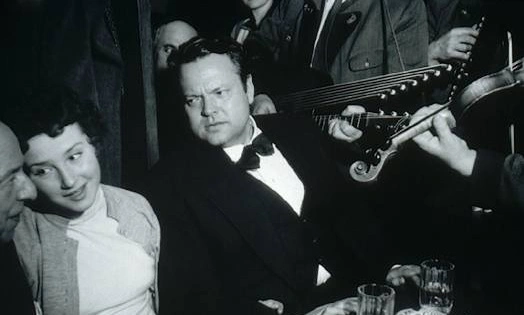Welles Orson
Publié le 31/03/2019

Extrait du document


«
Powered by TCPDF (www.tcpdf.org)Orson Welles
Orson Welles (1915-1985), American actor, producer, director, and writer, most noted for directing and starring in the landmark motion picture Citizen Kane (1941).
He was born in Kenosha, Wisconsin.
Rejecting college for world travel, Welles began his acting career in Ireland in 1931 and 1932.
He toured the United States with thecompany of American actor Katharine Cornell, and he then acted and directed with the Federal Theatre Project.
In 1937 he was a founder of the Mercury Theatre, whichproduced innovative stage and radio drama.
His 1938 radio version of The War of the Worlds by English author H.
G.
Wells was so realistic that thousands believed an alien attack was actually occurring.
Welles's first completed motion picture, Citizen Kane, is often cited as one of the finest films ever made.
Welles, then 25 years old, coscripted, starred in, and directed this psychological study of an American newspaper tycoon.
His innovative expressionistic use of sound and camera techniques greatly influenced later filmmakers.
Thefilm was not commercially successful, however, and Welles spent most of the next two decades in Europe, acting and directing and continuing to experiment.
Hedirected films that range from thrillers to television documentaries to works of English playwright William Shakespeare.
After Kane, Welles's greatest films (nearly all of which he both directed and acted in) were The Magnificent Ambersons (1942), The Stranger (1946), The Lady from Shanghai (1947), Macbeth (1948), Othello (finished in 1952 but not shown in the United States until 1955; reissued in 1992), A Touch of Evil (1958), and Chimes at Midnight (1966).
Other films he directed were Journey into Fear (1943), Mr.
Arkadin (1955), The Trial (1963), The Immortal Story (1968; originally for French television), and the semidocumentary F Is for Fake (1974).
Two films that were never completed but which have been released in unfinished posthumous versions are Welles's adaptation of Don Quixote (1992), on which he labored from 1957 to 1960, and It's All True (1993), the South American film that occupied him in 1942 and 1943.
His unfinished autobiographical film, The Other Side of the Wind, starring director and actor John Huston, was a longtime project (1970-1976) that has never been released.
Welles also acted in films directed by others, most notably in Jane Eyre (1944), The Third Man (1949), and Compulsion (1959).
In 1975 Welles received the Life Achievement Award of the American Film Institute.
Microsoft ® Encarta ® 2009. © 1993-2008 Microsoft Corporation.
All rights reserved..
»
↓↓↓ APERÇU DU DOCUMENT ↓↓↓
Liens utiles
- Welles Orson, 1915-1985, né à Kenosha (Wisconsin), acteur et cinéaste américain.
- Cocteau et Bazin, Orson Welles (extrait) - anthologie du cinéma.
- ORSON WELLES.
- Welles, Orson - acteur / actrice.
- William Hearst est le milliardaire américain qui inspira le héros du film d'Orson Welles: Citizen Kane.


